#and there are flaws in the system worth addressing
Explore tagged Tumblr posts
Text
Mmkay I liked part one of the LD finale much more than part two. Largely because I'm not into any narrative that comes down to "the status quo is always good and anyone who tries to disrupt hierarchical systems of power is bad" and "taking rogue action instead of following systems of authority is good when our protagonists do it and bad when the antagonists do it"
#why are you introducing moral complexity just to flatten it?#there is something to be said for disenfranchised white men who just want to replicate systems of power with themselves on top#but like if the story is about we believe in systems then the cerritos shouldn't be rewarded for going rogue#if the story is about sometimes you have to go rogue then we'd have more empathy for the mutineers#if the story is about not really knowing what they want to say then we'd get what we got#i'm intrigued by how everyone's character arcs are going#but i think that finale needed more development and refinement#i like ld because it's fun and light-hearted and really loves the source material while still poking warranted holes in it#and this was just a very sudden swerve from where they've been living up to this point which is that lower deckers do get a raw deal#and there are flaws in the system worth addressing#and was hinting at some nuance by referencing sito and the militarization#before promptly returning to shallower waters
5 notes
·
View notes
Text
5 tips for proofreading & their pros and cons
Define your objectives for each chapter. In my case, some of my chapters are better written than others. My objectives for them will differ. Before starting my proofreading, I list my needs and areas of improvements, and I write them down somewhere so I have them in front of me rather than in my head alone.
Pros : allows you to know which points you need to focus on ; provides a guideline adapted to your needs.
Cons : risk of losing homogeneity and fluidity + flaws may be shifted to other chapters that didn't have them before due to a sudden imbalance.
Plan several proofreading sessions, each one of them addressing ONE NEED AT A TIME. (E.g., one for grammar, another for style, and a final one for coherence. ) And I insist on the "one need at a time" part. Even for those who can multitask (unlike me), I really don't recommend settling for a single proofreading session. It could interfere with your concentration and let you skip some flaws. And please, always give your chapter a final read after your edits to ensure that the elements make sense as a whole, and are not repeated every two paragraphs (I plead guilty, your honor)
Pros: allows you to focus precisely on each point, and give it dedicated attention.
Cons: you can quickly get confused and risk multiple re-readings + significant time investment.
I make my corrections on a separate file. Whatever you do, it's always better to have a backup and therefore to save your files (don't blindly trust autosave) to create archives. I think it's a two-ways process : 1) you open two files simultaneously, one with your V1 and one, blank, where you'll rewrite your chapter as you make changes. Eventually, this new doc will become your V2 ; 2) you copy the parts to proofread into a new document and edit directly in there.
Pros: allows you to rewrite as you wish without being discouraged by the following paragraphs - especially in case of the first way.
Cons: requires multiple files (maybe multiple screens to be at ease) and better organization.
Change the typography. I don't know about you, but after a while, I'm struck by semantic satiation (click on the link - it's Wikipedia -, it's very interesting) and nothing makes sense anymore. After the 52,846th proofreading, I might as well read in another language. I've found a relatively effective trick - not as effective as a complete break, but sometimes you need to move forward - which consists of changing the typography. I can't remember who gave me this advice though, but be sure they've been thanked more than enough in my mind. In any case, seeing words change their shape significantly helps my brain to stay focused and attentive. (Maybe it's just my mind playing tricks on me but I only see the results.)
Pros: it's simple to implement.
Cons: I don't know if this trick works for everyone or if I'm the only weirdo (you can tell me in the comment section).
Take notes. This is a very personal tip but I keep a proofreading logbook. Like, I record in a few sentences the first time an element is mentioned, how it's describes, and most importantly… I MENTION THE DATES. The story I'm currently writing is heavily governed by a chronological system, so I have an absolute need to keep the day count up to date.
Pros: helps avoid inconsistencies and oversights.
Cons: very tedious to maintain and creates (a lot) of extra work.
I've started my prooreading journey yesterday and I already want to die. If I find in the edits something that is worth making a post, be sure that I will. Or let me know if you're simply curious.
Gentle reminder : Best is the worst enemy of good so, at some point, you'll have to let it go and let your chapter live its life to its fullest. Don't be hard on yourself and be proud of your work - or know that I am.
#writing#writing advice#writing a book#writeblr#writing resources#writing tips#writing tools#writing help#creative writing#writing process#writer problems#writer blog#writing journey#novel writing#writing challenge#about books and writing#essays#fiction writing#writerscommunity#writing style#books and literature#resources for writers#writers on tumblr#writing resource#writebrl
320 notes
·
View notes
Text
CLASSES - a comprehensive guide
The first thing that needs to be said is that there is no such thing as a "bad" class. All of them have the potential to be a great detriment OR great boon to the rest of the team, depending on how far along the journey of self-actualization a party member is. Some may have steeper challenges, but this corresponds with greater rewards.
The second thing that needs to be said is that all players are part of a team, and all personal journeys and playstyles are interlinked. No class is truly "solo." Even the smallest viable session is still two people, and even the most suitable classes for solo play are stronger when they're in a party.
The last thing that needs to be said is that the game wants you to succeed. The game, inherently, wants every player to reach godhood, wants every player to self-actualize, wants every player to win. It respects free will and free choice, so it will allow for failures (and, indeed, doomed timelines are vital to the alpha one existing), but Skaia is ultimately optimistic, and tries at every turn to ensure that a golden ending is possible.
Because, after all, SBURB/SGRUB - and Homestuck itself - are about children growing up, maturing, and learning compassion for each other. About fixing their flaws and rejecting the negative aspects of the society they came from. It's about how it is our duty, our responsibility, to become kind, mature people who care about one another, because we will one day be responsible for creating a new society.
And so, without further ado:
ACTIVE (-) Classes and PASSIVE (+) Classes are described with the dichotomy of "powers working for the self" vs. "powers working for others," but I believe this to be an oversimplification of what the active and passive split is. Both active AND passive classes benefit from being in a party; however, an active class will gain fewer party benefits in exchange for being more suited for solo play, while a passive class will be less suited for solo play, but confer much greater benefits to party play.
This is reflected in their personal quests: while active classes and passive classes will both require intervention, empathy, and guidance from their teammates, the struggle of an active class is usually one of grappling with internal flaws, and the struggle of a passive class is one of grappling with interpersonal or societal relations. In other words, the personal quest of an active player will usually involve getting therapized, while the personal quest of a passive player will usually involve addressing a systemic societal issue. Often, both will be required, but whether a class is active or passive will indicate an area of focus.
KNIGHT - / MAID +
PARTY MANAGEMENT
one who wields [aspect] or leads with [aspect] / one who distributes [aspect] or manages with [aspect]
KNIGHTS (-) are a very flexible and versatile class; "wielding" their aspect does not necessarily mean they are skilled at DPS. It actually indicates the way a knight interacts with their aspect, a very straightforward relationship of tradesperson and tool, or soldier and weapon. Similarly, while a knight does not always take up the "leader" position in the party, they will be the "spearhead," a point behind which the other players rally, a beating heart keeping the party together.
This straightforward relationship between a knight and their aspect leads to knights finding little difficulty mastering their aspect once they've begun. Many knights are, in fact, instinctively drawn toward utilizing their aspect, in the same way that they are naturally drawn toward roles of importance or heroism.
Knights often struggle with their perceived place in society, as well as with their innate sense of self and self-worth, seeing themselves as outcasts, resenting the responsibility placed on their shoulders, and fearing vulnerability. Unaddressed, these issues will lead to knights who actively become a detriment to party success. For example, they can dismiss valid concerns, shirk their duties, and in the worst case scenario, actively lead the party down the wrong path, invoking their natural ability to lead for ill.
Therefore, a knight's journey is one of accepting themselves and accepting their duty to better the world. It is about coming to terms with their own insecurities and learning to rely on others. It is about learning to take responsibility, and accepting the banner of a just and glorious cause.
A fully realized knight will be the center of every charge, the guiding star behind which the other players rally. They can provide clarity and guidance to those still on their journeys, and peace and comfort to those who are struggling or in pain. Where the knight goes, the party will follow, as a unified and united front.
MAIDS (+), meanwhile, tend to be on the backlines. If the knight is the forward march, then the maid is the supply line, an incredibly vital role whose absence is disastrous, even if its presence is nearly invisible. Maids have a nearly infinite well of their aspect to distribute, and are uniquely talented at managerial duties - keeping players on task, patching up the holes in a plan, sourcing and supplying resources, so on and so forth.
This is not to say that maids are relegated to support roles - a maid is usually capable of holding their own in combat just fine, especially if they've been endowed with a more combat-suited aspect. Both knights and maids are extremely versatile. That being said, maids truly shine when they're able to take on these backline roles, and many maids are more noticeable by the devastating effects of their absence rather than the invisible touch of their presence.
However, they are the class that most often starts in subservient conditions - low status, strict duties enforced upon them, so on - and their personal journey is a constant struggle against the control of others. Maids whose parties fail to grapple with and undo these shackling forces will find their maids succumbing to the influence or control of malicious entities; in the worst-case scenario, a maid can become an actively hostile enemy or saboteur, invisibly pulling the party's strings and setting them up for failure.
Therefore, a maid's journey is about rejecting societal oppression and throwing off the chains that bind them. A successful maid rises to become the head of the household - nothing occurs within the game that does not first pass the maid's inspection, and their touch ensures that there is a place for everything, and everything is in its place.
A free maid, who belongs to themselves, incomparably increases a party's efficiency. Every communication line is clear, every distribution route is clean, every mystery is solvable, and every plan is airtight. A maid guarantees that nothing can ever go too wrong.
PAGE - / HEIR +
TEAM BONDING
one who must earn [aspect] or inherits the mantle of [aspect] / one who is beloved by [aspect] or awakens to [aspect]
PAGES (-) start the game with the fewest benefits from their aspects, but the greatest potential for growth. Theirs is a constant battle with the self; they are often cowardly and naive. They possess sensitive souls, and while it is incredibly easy to hurt a page, it's much more difficult to build them up. Because of the difficulty of raising this class, it's practically defined by its journey - a constant struggle against the self - rather than its destination, and the powers the class confers.
Pages, like heirs, are classes of inheritance. A page is promoted by trials and tribulations and comes to inherit a greater power than they begin with; in the same way, the class will one day come to embody its aspect, although the road will always be turbulent and long. Moreover, it is a journey without end; pages, being as sensitive as they are, are the most prone to backwards progress, even after reaching their peak.
They prone to staying weak throughout the entire game, never self-actualizing past being the party joke. They attract the obsession and ridicule of stronger-willed players, and their mistreatment can become extremely divisive. A page can easily become a party's albatross, the epicenter of massive interpersonal conflicts, which can tank an entire session.
Therefore, a page's journey is one of the most difficult of all - that of teaching others how to care about other people. Pages rely on great patience, kindness, and understanding. Their sensitive souls must be carefully nurtured and propagated with love and attention. In the same way that a page can tear a team apart, they can bring a team together, all in the name of compassion and empathy. A fully-realized page is the symbol of a party that has linked hands with one another.
Self-actualized pages, as a result of the difficulty inherent to the class, are incredibly powerful and versatile when fully realized. Inheriting the mantle of their aspect, they become pure embodiments of their aspect, capable of achieving impossible feats of raw, unfiltered power, and inspiring all those who gaze upon them.
HEIRS (+) begin the game very strong, but have a difficult time becoming stronger. This is because their usage of their aspect is very instinctual to them, even at times being entirely beyond their control, hence, "beloved by" in the class description. However, because of how naturally their aspect comes to them, it makes taking further command of their powers difficult.
An heir "awakens to" their aspect because their natural, intuitive control often renders them too comfortable to grasp the greater implications of their class. As an inheritance class, heirs can come to embody their aspect, transforming entirely into it. Their challenge lies in breaking out of their comfortable shell and learning how to utilize their powers in more active, intentional ways.
This is reflected in their personal quests. They are often set to inherit great privilege or wealth prior to entering the game, and are thus naive to the realities of the suffering and pain of others. Without a supportive party willing to challenge their views, heirs can perpetuate that pain by submitting to their place in the world, becoming a divisive force within the party, or, in the worst case, losing themselves to their inheritance, and submitting so wholly to their aspect that they become lost to the rest of the team.
Thus, an heir's journey is to question the stratification of the society they belong to, so that they can recognize and address its flaws. They must learn to interrogate their inheritance, separate it from themselves, and reconcile with it. Theirs is an arc of examination and understanding, descending from their position of privilege and peace to learn about the suffering of others, and deciding that they wish to do something about it.
With full command over their aspect, and a clear vision for how it ought to be distributed, the party gains a new and powerful ally - the aspect itself, which will come to embrace the entire party as family. A fully-realized heir connects the privileged and underprivileged, spreading their inheritance to all.
MAGE - / SEER +
GUIDANCE
one who invokes [aspect] or is drawn to [aspect] / one who comprehends [aspect] or is guided by [aspect]
MAGES (-) are a class of prophets, although saying they "see the future" is misleading. Rather, mages "invoke" the future, collapsing causality to align to their desires. Most mages remain unaware that they are doing so until well into their journey. While all players weigh on the scale of causality, affecting both past and future events, and which sequence of events is the "alpha" sequence, mages have the most direct effect.
Because of this ability to invoke future events, mages possess powerful buffing/debuffing abilities. Furthermore, as one of the two knowledge classes, a mage usually has a very deep understanding of their aspect, and an intuitive knowledge of how the flow of time and causality function. They are "drawn to" their aspects in this way, instinctively searching out points where their influence can affect the flow of events.
However, with great power comes great cost; the mage class is usually assigned to those who are stricken by tragedies and prone to negativity and self-loathing. Mages often begin the game as a detriment to the party, "prophesying" future events that leave the party - including themselves - at a disadvantage. In the worst case scenario, a mage can invoke certain doom for their party or themselves.
Therefore, it is vital that a mage address their tragedies and be given a chance to heal and grow. The ones most struck by tragedy, theirs is a journey of reclaiming lost joy and rediscovering lost hope. However, the transformation is powerful once completed - as the one who suffers tragedy and loss most intimately, a mage can also come to be one of the most empathetic and compassionate members of the team.
If a mage is uplifted, and capable of believing in a kinder and gentler world, then their ability to invoke the future - and the aspects of their aspect that they are drawn to - become kinder, as well. Pain and suffering still have their place, but the ending will be a happy one. With a fully empowered mage, the future will always be better than what came before.
SEERS (+) see multiple branching paths. A mage determines where a road will be built, but a seer tells you where a road CAN be built. They are also often gifted with knowledge of the game and its mechanics, and are especially uniquely gifted with understanding of their own abilities. In this way, they "comprehend" their aspect.
Seers themselves are not particularly gifted in combat through their classpect alone; however, in exchange, they often play a vital role in steering the party. They are the game's built-in guides, with an intuitive knowledge of the game's victory conditions, as well as an instinctive desire to lead others along their paths. Seers are, therefore, one of the most important classes in the game, when one is present.
However, the ability to see is a burden as well as a gift. Seers find themselves paralyzed by choice, and often doubt their own abilities to choose "correctly." They are prone to becoming mired in what-ifs, and struggle with political or ethical debates with no clear answers. In the worst-case scenario, a seer may feel so cursed by their sight that they self-destruct, and deliberately choose poor or incomprehensible answers, in an attempt to free themselves of their sight.
Thus, a seer's quest is, ironically, to see the world beyond the purview of their aspect. They must come to have a more comprehensive understanding of the world they live in, and what purpose they are trying to achieve, so that they can feel confident in the choices they make. A seer is often blind - their journey, therefore, is that of regaining their vision, by connecting with the world outside their inner sight.
A seer with a clear vision for the future will always know exactly which path to choose. A party with such a seer in it will never be stuck and never be lost. If there exists a path to self-actualization, the seer will know it. And if there exists a path to a breathless and perfect victory, a fully-realized seer will light the way.
THIEF - / ROGUE +
UTILITY
one who steals [aspect] from others or steals with [aspect] / one who steals [aspect] for others or steals from [aspect]
THIEVES (-) are a very difficult class to play. They start out with almost no passive abilities regarding their aspect, and their ability to actively use their aspect is contingent on their ability to first "steal" it from someone else. Thus, they are always playing a game of resource management, and there is always a chance for them to be left helpless after a heist gone wrong.
However, their gimmicky nature allows them to overtake other classes even in that class's specialty, if they can set up the exact right circumstances and manage their resources well. This makes them incredibly versatile, especially when a thief is working together with a party, and thus able to count their party among their potential resources. It takes great cunning to play the thief class well.
However, this also makes the thief a potentially dangerous element to the rest of the party. Thieves are often egotistical and self-serving, willing to see enemies and allies alike as resources and tools. Unaddressed, their reckless, selfish natures will earn their teammates' distrust and enmity. In the worst case scenario, a thief running rampant can severely harm the party, or earn so much ire that the party turns against them.
Thus, their journey is that of realizing that their selfishness and ego are flaws - the classic parable of "money doesn't bring happiness." Beneath their uncaring surface lurks genuine emotional distress; a thief must come to realize that their greed and selfishness is an active detriment not only to the people around them, but their own selves. Only then can they heal from their injured souls.
A thief that has undertaken this journey is one who has realized that they are stronger when they are working with others. Their versatility, creativity, and cunning are incredible assets once harnessed toward the will of the party. No situation will ever be inescapable, no safe uncrackable, and no problem unsolvable - not if the thief has anything to say about it.
ROGUES (+) are similarly difficult to play. Unlike the thieves, rogues do see passive benefits from their aspects. However, their active abilities are much less straightforward, and rogues often struggle with understanding them. A rogue's role is to redistribute wealth - thus, "stealing for the sake of others."
A rogue, being able to steal directly from their aspect, truly shines when given enough time to prepare. If a thief must fly by the seat of their pants, then a rogue is a heist planner - they have an infinite box of tools to pull from, if only they know what tools they'll need for the job. This makes them incomparably versatile, even if not necessarily in the heat of combat.
Rogues take on the mantle of challenging the status quo. They usually begin the game already in opposition to their society, seeking out better alternatives and considering unorthodox options. However, not every party is ready for a rogue's radical ideology, and not every rogue has considered the full consequences of their belief in change; in the worst case scenario, the rogue can become outcasted and disregarded, or cause an upheaval that proves disastrous, rioting for the sake of rioting.
It often requires the help of others for a rogue to understand how to use their powers. In the same way, it requires the party's honest communication and exchange of ideas to help a rogue grasp exactly what form their rebellion ought to take. A rogue knows instinctively that something must change; their journey is learning how they ought to go about it.
Once they do, a rogue - given enough time to prepare and plan - is the ultimate utility player, having the right tool for every possible situation. Their abilities are only magnified in a party setting, as their teammates become variables that unlock new possibilities. A party with a fully-prepped rogue always has a perfect plan, a way to solve any problem that they might face.
WITCH - / SYLPH +
AREA CONTROL
one who manipulates [aspect] or achieves dominion through [aspect] / one who nurtures [aspect] or creates a land of [aspect]
WITCHES (-) carry with them the winds of change. A witch manipulates, changing properties of their aspect and their aspect's effect on others, creating a "territory" over which they rule. They see few passive benefits of their aspects, in exchange for their active abilities being so all-encompassing and overwhelming.
Once their territory has been established, witches make the rules. Their changes can be permanent, temporary, massive, and miniscule. However, a witch "achieves dominion" with their aspect - this means that they must first struggle to create this domain, and it's difficult for their abilities to manifest until they do, often leaving younger witches weak and vulnerable.
Witches have strong feelings for how things should and should not be, but not necessarily grounded ideas for how to implement them, often due to some "outsider" status in society. Unfocused witches become dangerous for the party, as they are easily manipulated; in the worst-case scenario, they can fall in with malicious forces, who can sway a witch's turbulent heart and utilize them as a force for negative change, rather than good.
Thus, a witch's journey is that of interrogating right and wrong. A witch must struggle with morality and ethics, and come to clarify their own beliefs; only then can they know what sort of domain they wish to establish, and what sort of rules they wish to enforce. Once they know their own hearts, they can shake off the insidious whispers of malicious external influence.
As if a reward for their struggles for autonomy and independence, the witch is the one whose will is most imposed on the world that comes after them. Just as an evil witch putrefies the world around them, a fully-realized witch who has decided to use their influence for good can create a near-utopia.
SYLPHS (+) call to mind the images of fey folk who sprout plants where they walk. That is how a sylph "creates a land" of their aspect - merely by existing, the world around them becomes suffused by it. A sylph's mere presence nurtures, grows, and heals their aspect; unlike witches, who manipulate what is already there, sylphs can create something from nothing.
The establishment of their domain comes naturally to them. Those caught within it are on the receiving end of their aspect, whether they want to be or not. In exchange for such powerful passive abilities, a sylph's active abilities are weaker, and usually unsuited for solo combat, generally being of healing, buffing, or debuffing nature.
A sylph is prone to selfishness - to luxuriating within their own land, their own aspect, their own mind. They often have difficulty connecting with others and understanding why their own personal world may not be to the liking of the world outside of themselves. Often, they are aloof. An unrealized sylph can cause great harm to the world around them, their domain choking out and smothering their party; in the worst case, they can mire their party within it, leaving their party unable to proceed.
Thus, it often requires the outside world to breach their safe haven in order for a sylph to grow. They must be made uncomfortable, and then made to accept that uncomfortable things are also important - maybe even more important than comfort, at times. Growth often requires pruning; a sylph's journey is to come to understand that good intentions may lead to harm, and, vice versa, that harm can often lead to true growth.
Sylphs can provide the greatest compassion and emotional comfort within a party, encouraging - if not enabling - their teammates' growth in their personal journeys. Once a sylph understands when it is appropriate to encourage, and when it is appropriate to pull back, there is no refuge safer for the party than the sylph's domain.
PRINCE - / BARD +
OBSTACLE REMOVAL
one who destroys [aspect] or destroys with [aspect] / one who allows the destruction of [aspect] or allows destruction through [aspect]
PRINCES (-) possess the ability to annihilate, a destructive class not limited to physical or tangible objects. Princes also enjoy auxiliary benefits as befits their royal titles - many princes start the game with great talents, great status and wealth, or both. They are also endowed with royal presence; their very existence provokes strong emotions from those around them, for good or for ill.
One of the more straightforward classes in the game, a prince's ability to destroy most commonly manifests as DPS. However, their abilities encompass a greater scope than mere damage - the prince's ability to annihilate figurative or metaphysical concepts makes them capable of directly removing any obstacles that stand in their way. As if hungry to consume their aspect, they are naturally drawn towards where it congregates.
However, with great power comes great responsibility: princes are often the most psychologically maligned within the party, and their destructive talents can very easily become self-destructive instead. Usually the result of societal pressure, trauma, and suffering, a prince is prone to embodying the lack of their aspect, rather than its presence. In the worst-case scenario, a prince spreads this misfortune to the rest of their party, destroying the presence of their aspect from their session altogether, often taking themselves along with it.
A prince must be shown compassion. Though they are often viscerally unpleasant to engage with, turning a blind eye to foolishness, loneliness, and suffering - which a prince embodies - is one of the worst things that a party can do. Though the effort at times seems undeserved, to heal a prince requires a staunch belief that there is good to be gained if we are kind to each other. This kindness will be returned; once you are counted among a prince's "people," they will do anything to keep harm from befalling you.
A prince, once shown this grace, is incomparably powerful. To destroy their aspect or with their aspect is the ability to destroy nearly anything, including concepts such as despair, death, and doom. As if proclaiming a royal decree, a fully-realized prince can banish misfortune and ill tidings altogether, leaving nothing standing in the party's way.
BARDS (+) are a wildcard of a class, often responsible for a party's improbable victory, abject defeat, or both. Their abilities are not very well-understood, even by the bard themselves, and they often utilize both passive and active abilities intuitively, unaware that they are doing so. The morale of the party is deeply tied to the bard's own, and it's unclear which side is cause and which is effect.
The ability to allow the destruction of their aspect, or invite it through their aspect, is actually something of a debuff rather than DPS - the bard's ability is to break unbreakable shields, tear down unclimbable walls, and nullify unstoppable forces. Rather than dealing damage themselves, they allow for damage to be dealt that would otherwise have no effect - in other words, by nature, they make the impossible possible. This is the true source of their ability to evoke "miraculous" situations.
Bards are inextricably tied to society - after all, their tales only hold as much value as their relevance to the audience. This means those with the bard class are invariably molded by the worst aspects of the society they come from. They serve as living embodiments of the most unpleasant aspects of society, and living reminders that leaving these elements to fester only means they will multiply in severity. If these beliefs are allowed to go unexamined, bards will always steer a party towards ruin.
Therefore, a party must engage with the bard earnestly, compassionately, and openly, and help them see the errors of the past. A bard must be led, with gentle guidance and genuine openness, to discard their harmful beliefs, and sing a new, more beautiful tune.
A bard that has been brought back into the fold is a worker of miracles. When every other possible option has been exhausted - the knight and maid in disarray, the page and heir unable to keep the party together, the mage and seer blinded, the thief and rogue out of action, the witch and sylph with their territory lost, the prince no longer able to function - this is where a bard will step in, transmuting abject defeat into a perfect and breathless victory.
#homestuck#classpect#classpects#just my own opinions obviously#feel free to disagree#this is also more meant to examine the actual text of homestuck or serve as a reference for fanworks#i dont actually vibe that much with classpecting actual real people#because unlike fictional characters we contain multitudes#still i cant STOP you if thats what you want to do hahahah
569 notes
·
View notes
Text
I hope that having the Mighty Nein around helps the cast help each other with the stagnant parts of Bell’s Hells character arcs.
The Hells are not good at communicating with each other about their faults. Enter Jester, Veth, and Caduceus, who absolutely will call people out on shit without shame or malice.
The Hells have a narrow view of religion. Here’s Yasha, whose god helped her break away from an apocalyptic cult; Caduceus, who was raised in a religious household and likes helping people even when they don’t share his faith; Fjord, who found peace and self-acceptance with guidance from a goddess who asks so little of him; Jester, who somehow has cleric powers from her fey best friend whom she also carries around as her weasel sometimes; and Beau, who doesn’t worship Ioun outright, but still thinks she’s not bad and seeks out a connection at times.
The Hells don’t much care about other people when they talk about what the world should be like. Here’s Caleb, who wanted to turn back time, then got Wish and could do it literally any day he pleased, but has accepted that in order to change from the boy who was willing to kill his parents, he has to be the man that won’t break the world to bring them back. Beau accepted that people can be flawed in how they love, but she couldn’t let that decide whether she or anyone else is worth love or protection; her whole job is about trying to help the people of the Empire when systems don’t care about them. Fjord handed over an eye of Uk’otoa to save Jester’s life, and then immediately got the Nein back together to defeat Uk’otoa rather than let other people suffer the consequences for his choice.
The Hells were sympathetic to the All-Minds-Burn and only really balked at the Weave Mind because there was a controlling group at the top instead of a regular hive mind. Here’s the team that destroyed Cognouza because it turns out hive minds are a great way for despots to directly control a lot of people and use them like resources. Yasha and Caleb also have profound experience with mind control, conditioning, and memory wiping.
The Hells have some serious identity issues that haven’t been addressed because there’s just no time. (Ashton was an aasimar turned into a genasi; Laudna was treated like a Vex voodoo doll by a wizard who hates Vex; Fearne was conceived and sought specifically to be an exaltant vessel for Predathos; Imogen was hidden to avoid that.) Veth was turned into a goblin by a hag, was racist against goblins for years, eventually realized that her racism came from self-hatred for traits she shared with a specific goblin tribe, and got turned back into a halfling thanks to the dedication of her friends. Fjord wrestled with determining who he was before realizing he had to choose, and that didn’t mean there was a right or wrong choice; just that he couldn’t be someone else.
Like, the Nein would be great for some targeted discussion of these points if the Hells let their judgmental bullshit shine through at any point. It’s just a question of whether (a) the cast want to and put in the effort to do that, and (b) how much time they have to spare for those conversations.
124 notes
·
View notes
Text
"everyone in mapleshade's vengeance (minus the kits and whatever other exceptions whatever person making this point opts to include) is a bad person" is a take that does indeed work to establish that yes, this is a story piloted by every party with any agency acting out of cruelty and hurting others, and is also an attempt at gesturing towards nuance (or at least, thinking outside of black and white morality. it is in itself a kinda inherently un-nuanced take) within the idea of good vs evil in the story. however where i believe the issue with the phrase lies is in the assertion that the reason why these characters are enacting violence on each other is because of some unique inherent nastiness they were born with or that were predisposed into their character writing rather than addressing that their flaws (while still horrible) are specifically systemically driven.
before she kills ravenwing, mapleshade commits no crime that is worth the persecution she faces, and her mistakes are in fear of facing what she inevitably does. she does not obfuscate information about her childrens' parentage or take them into that river out of malice or uncaring, she does it because she lives in a society that will exile her children in a storm once it finds out that they are illegitimate, and see that she leaves. the birchface thing likely exacerbated her punishment, sure, but she still had no safety net. if it could happen under that circumstance it could happen under any, and that is the tragedy of it. (the bridge-she-couldve-crossed thing is clearly not something the authors remembered or considered so is kind of textually irrelevant)
likewise, frecklewish does not display some unique inherent xenophobia to herself that we don't also see across the timeline from dotc to present, that even characters the writers intend as sympathetic like crowfeather and gray wing will display. this doesn't whatsoever absolve her of culpability, cruelty is cruelty regardless of the source, but it isn't her that is the source of her own hatred, it is the clan system, and her own grief that is amplifying it. "frecklewish wasn't sent to the dark forest for the river thing, it was because she yelled at the kids" is a funny take because yeah to us the readers her violent outburst is clearly her "wrong", but in-universe i really don't think starclan would care LMAO.
now, as with a lot of things in warrior cats that are deeper than the text on page i''m not sure the erins are necessarily consciously Trying to write the clan system as an inherently cruel, violent, and bigoted system- they might very well be throwing in antagonistic characters with the intent that their prejudices and toxic patriotism just form naturally and randomly like mutuations- but as i've said before i do find an interesting parallel between the series' necessity to maintain its status quo and flow of conflict for sake of marketability and series continuation, and the fact that the world in-universe has a code with xenophobia baked into its laws and consistently writes conflicts about the cruelty of the warrior code without ever being able to take steps to major to address and remedy the flaws that lead to this conflict lest it Paint The Clans As The Bad Guys or force them to step too far away from their tried and true formula, so the cycle continues. i think that's the tragedy of mapleshade's vengeance to me- it's a story that occurs because of some pointless interclan war about rocks or whatever else and everything that occurs to mapleshade is done to her by cogs and/or perpatrators of this machine that values compliance and order and clan isolationism. she's a minorly selfish and oblivious person, she isn't born evil. the people that hurt her aren't conniving supervillains, they're just people with the capacity for cruelty given the motivation and the chance. and that's worse, in a way, because they come out on the right side of history and like a dozen generations later squirrelflight and leafpool are going to get put on a trial to go to hell for the same crime that got her exiled, because the system is fucked and the system hasn't changed.
142 notes
·
View notes
Note
So if you got the chance to rewrite the shadow and bone series to 1) ACTUALLY make it good, 2) have Alessandro get what he wants and needs for the Grisha and 3) have a love interest who would want to join him, what would be the plot? Would it be a series? This would be so cool to know
Hi! Thanks for a very interesting question.
So, let's see what I would have changed. No promises it's actually good, but I'll try.
Of course, we would give Aleksander a way more prominent role in the book. He's such an interesting character with tons of political and military experience; watching him work through the twisted intricacies of the corrupt Ravkan system could have been extremely fascinating. We don't need to whitewash him: he's interesting in his complexity, so making him ruthless and ready to use questionable methods for his cause is important.
The love interest. We can keep the Sun Summoner (light/dark aesthetic is quite gorgeous after all), but make them interesting. I'm always annoyed when a character with light powers is painted as a paragon of virtue and kindness. How is that the sun? It's burning bright, it's full of energy, it's unstoppable, and it can destroy everything in its path. I see this character as impulsive, temperamental, and ambitious, maybe a little arrogant and capricious, but not stupid, self-serving, or needlessly cruel. They do want to help Grisha, they do want to bring about the change and exact justice, though through different methods.
The Fold, though originally created by Aleksander, might exist as a distraction, meant to fuel anti-Grisha sentiment, elicit a superstitious fear of magic in the non-magical population, and also as a scapegoat to blame all Ravka's problems on it instead of the real culprit - the corrupt monarchy. Maybe even volcra attacks are staged to keep people in line. Destroying the Fold already doesn't solve anything in canon, but we can make it more intentional by acknowledging the actual villain - the system. In the end, I wouldn't destroy it but rather reframe it- make it a protective barrier and a symbol of Ravkan power instead of a mystical eldritch horror.
The Sun Cult feeding people propaganda about the Sun Summoner, who will come and magically solve all the problems, also can play a more important role in the manipulation, control, and intimidation of the population. Exploring the corrupted cult angle might be interesting.
The relationship between Aleksander and his love interest doesn't have to be smooth sailing. They might initially mistrust each other, and the clash between Aleksander's desire to control everything and the Sun Summoner's ambitions might force them apart for the time being, until they realize that their powers work better together and their common goal is worth putting aside their differences. Ultimately, they should be challenging each other, balancing each other, and, while arguing, still understanding each other on a deeper level. They are, after all, two sides of the same coin. Love is not one side changing and fixing the other to their preferences; it's a union of two flawed people finding solace and acceptance in each other.
I would dedicate much more time to politics, because it's much more important and fascinating than hunting magical artifacts. The real villains (the Lantsov dynasty, Druskelle, and Grisha oppression in general) should receive a much more serious treatment instead of playing the role of a backdrop. The topics of the cost of revolution, fight for freedom, difficult choices, and sacrifice can be explored in a more meaningful way.
Thematically, we would get rid of the "power corrupts" message. "Power reveals who you are" is a way more sensible and honest approach. Also, we would need to address the duality of light/shadow powers. It can be tied to the point of their balance: shadows without light are stagnation and despair, and light without shadows is a scorched radioactive wasteland. One is not meant to absorb or banish another; they are meant to coexist in harmony and balance each other.
In the end, it's a hard-won victory, with no momentary magical fixes and dragon-shaped deus-ex-machina. The old system is taken down; the new one is being built.
#grishaverse#grishaverse critical#the darkling#aleksander morozova#anti grishaverse#kinda#ask#ask me anything
21 notes
·
View notes
Text
The Far Roofs
So today I want to talk a bit about what this game wants to be. In particular, I'm going to go over its key technical and artistic goals.
The Far Roofs focuses on immersive hidden world fantasy adventure. It's intended to offer the experience of a grounded, emotionally real base world attached to an idealized, fantastic "hidden world" setting.
One might say, the streets and buildings and houses of the game's world are basically our own. Above us, though, is a stranger, more idealized, and more fantastic place. It's hard to get to. It's dangerous. It's less grounded. It's full of wonder.
Those are the Far Roofs.
This divide exists to make the game feel as real as possible, if you want to go that way. That's part of what hidden world fantasy is about, after all---the idea that magic is here. That it's not in some distant alien land or mythic future or past.
It's here, if you want to reach for it.
(Now, the game is flexible enough that you can play "protagonist" types instead of realer people, and many traditional gaming groups will probably prefer that, but that'll mean getting less of that immersive effect.)
The mood the game is interested in is that feeling you get when you take a huge risk---move to a new place; try a new thing. The feeling you get in those times in your life when everything is alienated and wondrous and terrifying but there's also so much more *hope* than there was in the still times before.
It's a mood of being swept up and called forward.
This is, among other things, meant to be a game for people who've been beaten down or exhausted by the ... everything ... to feel that sensation of moving forward again.
To remember what it's like, why it's worth it, how to reach for it again.
It's meant---and I do understand that I am finite and flawed and this can only go so far---as a tonic and refreshment to the soul.
--
Rules
The Far Roofs uses a 5d6-based dice pool system for day-to-day task resolution. It's relatively traditional and optimized for fast, fun dice reading. There's a loose consensus I've seen in RPG design circles that dice are for when outcomes are uncertain and both options are interesting, and I don't disagree ... but there's also this thing where rolling dice to decide is intrinsically interesting and fun, where it's fuel for a certain part of the brain.
This game tries to get as much out of that side of dice as it can.
You'll also collect letter tiles and cards over the course of the game. This is for bigger-picture stuff:
To answer big questions and to complete big projects, you'll either assemble representative words out of those tiles, or, play a poker hand built out of those cards. Word and their nuances express ideas and shape how outcomes play out; poker hands, conversely, just give a qualitative measure of how much work you do or how well things will go.
In keeping with this, the campaign is represented principally in the form of questions or issues your words and hands can address. Player/GM-created campaigns would be the same.
--
Physical and Electronic Product
I wanted to put the print version within the range of as many people who might need that tonic as possible. That means that for this particular game, I wanted to cover the full territory that I'd normally cover in a two or three volume set (core rules, setting, and campaign) in a single 200-250-page volume.
In practice this means there's a guide and examples for constructing the setting, rather than a deep dive into a fully-detailed world; that there's a bit less in the way of whimsical digression and flourish than in the writing I'm known for; that there's minimal "flavor" text on abilities; and that the campaign presentation is pretty fast-paced.
Conversely, it means that the game should be easy to absorb and to share with other possible players, and, that the game and campaign in this one relatively small volume should provide enough content for five or six years of play.
The book will be 8.5"x11" with grayscale art, available in a limited hardcover print run and a print-on-demand softcover form.
--
On the Rats
You'll see a lot of talk from me and others about the talking rats in this game. They're one of the jewels of the experience, and I think they're probably a significant draw just for being talking rats that are core to the game.
... but I'm going to hold off for now, because, to be clear, this is not a game of playing talking rats. It's just a game where talking rats and probably one of the top three most important setting elements.
I couldn't get that feeling I wanted of ... the base world being grounded realism; of the hidden world pulling you up and out and into a world full of magic ... with your playing rats, with your playing something so distant from the typical player.
So this is not a game of playing them.
They're just ... I like rats, and so I made the rats in this game with love. They're great ... whatever the equivalent is to "psychopomps" is for a magical world instead of for death ... and a way of talking about how in the face of the world, we're all pretty small.
--
I'm really excited about this game; the playtest was lovely.
I hope you'll enjoy it as well!
206 notes
·
View notes
Note
ahhhh thanks for entertaining my yapping and adding your insights onto them. i really like your takes and explanations on them. it hits things that i never thought about. feel free to disregard this one because it feels a little less coherent. related to dazai being one of atsushi's motivators, it kind of hit me that dazai is one of the first people atsushi saved. maybe this is a misinterpretation of their first meeting, but, turning off the comedic lens, it's actually an insane scenario. a starving, societally clueless orphan musters all his strength to swim and hulk an unconscious person back to shore. the inherent and somewhat foolish compassion of such an act to still give when you basically have nothing left comically is lost on atsushi despite performing such an action because he's so embedded in his self-hatred and lack of confidence. it's honestly made even better by the fact that dazai has ability nullification powers, so he cannot passively rely on the tiger's strength (although i am unsure if he was able to do that prior). he is actively burning what remaining energy he should be using to find food or shelter to save someone he believed needed help. i think this action is what immediately takes dazai to atsushi to which dazai repays by providing him a support system to navigate his new reality and the weight of trust and faith that atsushi wants to uphold. it's a little sad though, due to atsushi's lack of confidence, that he kind of seems to believe dazai made an arbitrary decision to save him rather than him being deserving of such care, and maybe that plays into atsushi's view of dazai as a savior. it probably doesn't help that dazai both does and doesn't want to be understood. but, maybe the silver lining about it is that it plays into why he tries to understand dazai and, subsequentially, recognizes how flawed and maybe 'human' he is. like how atsushi helps validate dazai's capacity to care and be "good," dazai validates helps atsushi validate his own self-worth and belief in his own actions.
No, no, this is actually so coherent! And I'm really glad that you're sharing it. I'm always super happy to respond and talk about those two (or, to be fair, any BSD characters, since I love talking about how I and others interpret them as a whole or in relationships, whether platonic, romantic, or something totally different).
And yeah, if you actually step back from the comedic lens and look at what’s really happening in that first meeting, it’s genuinely wild. Atsushi’s just been kicked out of the orphanage, he’s on the brink of starvation, and yet he can’t let Dazai drown. Though, it’s worth pointing out that Atsushi wanted to leave him there at first, and when he does save him, his initial thoughts are about robbing him. Plus, let’s not forget that Atsushi is offended when Dazai casually admits he has no money.
I think it’s important to highlight those parts because they get overlooked a lot. People tend to remember that Atsushi saved Dazai and interpret it as this purely selfless act, but it’s more complicated than that. Sure, you could argue there’s some kindness there, but a lot of his actions in that moment come from his deep-seated self-worth issues. Atsushi’s been conditioned to believe that his value is tied to what he can do for others, that he’s less than worthless if he doesn’t contribute or help in some way. And I’ve said this before, but to me, Atsushi isn’t naturally kind as a personality trait—he’s kind by virtue. That kindness was beaten into him over time (at least, that’s how I interpret it).
Still, even at his lowest, Atsushi can’t completely suppress that unfiltered compassion. It’s just part of who he is, whether he recognizes it or not. Dazai ends up being the first person Atsushi saves, yet their first meeting is often overlooked by the fandom. But there are some key details that need to be addressed if we’re talking a bit canon-wise.
The fact is, Dazai knew from the start who Atsushi was. The meeting between the two was orchestrated. He admitted that to Hirotsu—that he recruited Atsushi specifically to complement Akutagawa's ability. He doesn’t really go into detail about their first meeting, but Kunikida does mention that Dazai suddenly jumped into the river, which, knowing him for as long as we did, it’s very easy to tell that he did it on purpose.
And that’s where the meeting actually gets even more fascinating. Dazai orchestrated the encounter, knowing full well who Atsushi was and the potential he had. This adds a layer of manipulation to the scene, but not in a malicious way. It does show how much Dazai is calculative and manipulative from the get-go. He was always playing the long game.
However, the brilliance of that scene lies in how genuine it feels on both ends, despite Dazai’s manipulation. Atsushi, barely clinging to life himself, chooses to save Dazai even though it’s the furthest thing from rational. Yes, Atsushi hesitates. Yes, his initial thoughts are about leaving or even robbing the unconscious man. But he still takes action. That act isn’t purely selfless; Atsushi has been conditioned to believe that his worth is tied to what he can do for others, making self-sacrificial choices almost second nature to him. It’s a survival mechanism born from years of abuse at the orphanage.
But despite the meeting between the two being totally orchestrated by Dazai pulling the strings, one shouldn’t just interpret it as completely devoid of sincerity. Dazai, as a character, is himself a contradiction. He’s a master manipulator, but he also deeply cares for the people he chooses to "invest" in (admit it or not). And, of course, Atsushi became one of those people.
For Atsushi, the encounter is unsettling. He doesn’t see himself as someone who deserves salvation or a second chance (he himself wanted to live out of spite in episode 1, with how he was talking about "showing them" that he can survive—of course, talking about the orphanage). When Dazai brings him into the ADA, Atsushi interprets it not as an acknowledgment of his worth but as a random act of charity. This feeds into Atsushi’s view of Dazai as a savior figure—someone who plucked him out of despair for reasons Atsushi can’t truly understand. Their dynamic is heartbreaking because Atsushi genuinely doesn’t believe he’s worthy of that care.
On Dazai’s end, there’s an interesting tension in how he interacts with Atsushi. While he’s quick to assign Atsushi missions and responsibilities, he also tends to avoid directly confronting Atsushi’s insecurities. Instead, he uses humor, teasing, and indirect guidance to nudge Atsushi toward growth. He doesn’t, however, see Atsushi as a tool to balance Akutagawa (as he does come to genuinely care for the other), but also as someone who could become a force for good. Dazai’s own issues and self-worth—his belief in his "inherent evil"—sometimes prevent him from expressing those thoughts openly, as it’s hard for him to be vulnerable (though he manages it every once in a while).
What’s fascinating is how this relationship challenges them both. Atsushi’s reverence for Dazai forces him to grapple with Dazai’s flaws and contradictions, which ultimately helps Atsushi see Dazai as a person rather than a pedestal. Meanwhile, Atsushi’s unwavering determination and raw compassion act as a quiet reminder to Dazai that goodness isn’t an abstract ideal, but something you choose again and again, no matter how messy or imperfect the process may be. (For what is kindness as a trait, if it is not practiced?)
I think I went a bit outside of what you were asking of me, but the thought kind of spiraled, haha... Also a little note that I also wanted to include but didn't know how. When it comes to Dazai and him wanting to be understood but also not. It's like Dazai walks into a room and leaves it open but before anyone can open it, he already build a brick wall between the room and the door, giving you clear message of "I don't want you" but also hoping, begging and craving for you to chip away at the wall, to break in.
#Dazatsu#dazushi#BSD ASKS#BSD ASK#asks#bsd atsushi#bungo stray dogs#atsushi nakajima#bsd dazai#osamu dazai#dazai osamu#bungou stray dogs#dazai x atsushi#atsushi x dazai#hc#headcanon#headcanons
32 notes
·
View notes
Text
Beyond the Bookshelves (3)
Pairing: Loki x Reader
Warnings: Obnoxious coworkers, what is the proper ettiquette when emailing princes, teasing Captain
Summary: You're a Resource Management Specialist at S.H.I.E.L.D. normally referred to as “The Librarian”. You've been assigned the nightmarish task of digitizing all the physical resources currently owned by the agency, with a few new computers and one extra helper.
A/N: Please comment/like/reblog. If you'd like to be tagged moving forward, please let me know!
The lovely banners used in this fic are from @cafekitsune.
If you’re new to the story, please check out the master post for the rest of the chapters.

The meeting was as boring as the fallen prince expected it to be, but he hardly showed his disdain for his time being wasted. Cabinet meetings and audiences with nobility and dignitaries were expected and mandatory for royals. In his opinion, a majority of them were hardly worth the time and could be easily sorted out with logic, but politics hardly worked that way. It was fickle, changing at the whim of whomever is more powerful. And though at times it was fun to see how the spoiled nobles would squabble over the most ridiculous things, the majority of it was always dull.
To think I once found such a thing mesmerizing as a young boy, wanting to follow my father everywhere and prove myself useful to him. A moment to shine, to step out of the immense shadow casted by my brother. The corners of his lips tugged downwards at the miasma of memories that began to stir. He knew the ledge was a precarious one and a single thought could have him plummeting to the depths and ensnare him.
“Do you have any questions?” The agent looked at the members of the group one by one, hesitating and nearly jumping over Loki to avoid eye contact.
“Agent Pruyn, was it?” He watched the man who was addressing them flinch at the call of his name. “Would it not be wiser for me to be the one who distracts them? I am able to change my image to look like anyone. I would merely need some footage of the person I am to imitate to better play the role. You will also be able to monitor my movements since I will be in the banquet hall as opposed to behind the scenes searching through the office.” Minimal footage of me in questionable places is best. Who knows what someone might do as an act of vengeance.
“No, this is the best plan of action. Hawkeye is better suited for that portion of the mission and needs support while Black Widow distracts the target.” Agent Pruyn cleared his throat. The lack of negative reaction from the others seemed to embolden him a little bit. “Also, are you implying that she can't handle it? Black Widow is the best undercover agent we have. She's successfully infiltrated hundreds of places while you've only failed at discretion.” He scoffed.
There it was. The bias and condescending tone, the twisting of his words, and the lack of support. Such insolence made his blood boil to the point of physically punishing the fool, but he kept his reactions in check with a blank expression. Silently, he changed the way they perceived him to look identical to the infamous fiery haired operative who was sitting with them. Everyone in the room stared at him in wide eyed shock, looking at him and her to see if there was a difference.
“Well isn't that a neat little trick.” Natasha was the first to break the silence. “Certainly beats needing to put on that holographic skin.” She leaned in closer, trying to find some flaw.
“Stare all you like, you won’t be able to tell the difference unless I let you.” He said in her voice.
“If he’s so good at keeping up an appearance, why not just swap them? Nat and I are equally able to get in and out without issues if there’s a good enough diversion.” Clint shrugged, though he was impressed at how perfectly Loki copied her.
“I don’t have an issue with that change, I’m the one who can break into the computer system they have. It’s better if I’m with Clint.” Natasha agreed, Loki shifting back to himself.
“So, we’re in agreement. I will be the one to keep the group busy and the both of you will gather the necessary information. As I stated, I’ll require footage and data on the individual I’ll be impersonating.” He turned his attention back to Agent Pruyn who seemed rather cross with the change to his plan but said nothing since the other two Avengers were agreeing with Loki.
“We’ll need to adjust the timeline of the operation then. Everything was set up for this plan, we’ll need to adjust and see if there’s another gathering we can infiltrate.”
“You say this person of interest has possible ties to this Hydra organization, correct? Why don’t we get ourselves invited to his home or wherever you think he is housing the necessary information? Why must we wait for some large gathering outside somewhere else?” Loki questioned.
“We can’t just waltz into his home unannounced.” Agent Pruyn scoffed. “Do you think he just calls people over for tea time? This isn’t one of your royal games, Loki.” The condescending tone was back once more with a sense of triumph. This was hardly enough to anger the prince, but he was not so lenient to let it slide for a second time.
“Who said anything about tea?” He looked at the agent with raised eyebrows. “I wasn’t aware you had the time for such frivolous plans. I must disappoint you, my plans do not allot time for such.” Agent Pruyn grit his teeth and glared at the insouciant attitude the Asgardian was speaking with to him. A few of the other members of the meeting snickered at the calm retort, looking away to avoid the ire of the presenter. “This target has questionable connections and has a proclivity to feign a charitable appearance through auctions. We need to approach him as someone equally shady who wishes to either wash their hands of some item or trade an item to someone else and obtain the money under the guise of donating to said charity. We simply need to choose someone from his connections or create someone completely new.”
“That,” Natasha was the first to speak, coincidentally cutting Pruyn off, “is an excellent idea. If we came as someone new, trying to make a name for themself, they’ll be more likely to accept us if we come with an item of great value. Loki can play the part of the client and I can easily play the part of his assistant as needed to keep up the facade. Once we’re invited in, I can get Clint inside and we can get the information we need while the auction is going on.”
“Until the auction takes place, we can build a relationship with him and others. We can record all the conversations and pick up on any codes they use to discuss the secret dealings!” A female agent chimed in soon after, realizing an extra benefit to this plan.
“This makes it a much longer plan than anticipated though, we’ll have to resubmit the plan to our lead agent and to Director Fury.” A male agent pointed out.
“Sounds like it’s a necessary delay if it’s going to be more fruitful than the original operation. I guess Thor wasn’t exaggerating when he boasted about how strategic you are.” Clint slightly nodded his head in approval. “Redraft the plan and submit it, we’ll see what Fury says before moving forward.”
“We’ll schedule our next meeting after that.” Natasha nodded, standing from her seat. The others followed her actions and the meeting came to an end with a very irate Pruyn glaring at the back of Loki’s head. A small smirk of satisfaction tugged at the Asgardians lips as he walked down the halls, feeling lighter at proving himself as worthy to be on the team.

Y/N stared at the screen of her computer, willing it to fill the empty body of the email that was addressed to the two Avengers she was allowed to work with. Glancing at the time, she groaned audibly and turned her chair around so her back was to the screen.
Three hours, I’ve been staring at this blasted computer screen for three hours! Why do I need to message them!? Wasn’t Agent Hill supposed to coordinate this? Why is everything suddenly dumped on me from start to finish? This is ridiculous! Next they’ll want me to manage their schedules and make sure they have time to complete their missions and assist in my never ending task! I am not some over glorified secretary, I am the head of the Resource Management department, the director of it! I attend all the ridiculous morning meetings, check-ins, and any other waste of time meeting that could have easily been an email instead while managing all centers that contain our resources, digital and physical! She pushed herself out of the chair and paced in the space she had behind the desk. “When am I supposed to even meet with them when both are due to be deployed this week!” She threw her hands in the air as she shouted into the empty office. Defeated, she slumped back into her seat and turned to face the computer once more.
She did not want to wait until their return, she needed it done now so that while they were gone she could have the computers and scanners set up and be ready to start as soon as they returned. Straightening up her posture, she pulled the keyboard forward and quickly began to type a brief email stating she was approached by Agent Hill and wanted to set up a short meeting in person to introduce herself and better understand how to properly utilize their assistance and time. She also added that the both of them are available tomorrow after lunch for a brief period of time. Rereading her email over and over again, she made sure there was no error before finally hitting the send. Now she had to wait for a response. Thankfully, the chime signaling the door opening was a great distraction, letting her escape the panic while waiting for a response.
“Good afternoon, how may I help you?” She happily greeted the person as she stepped out of her office. “Oh, Captain Rogers, how are you?”
“Good afternoon Y/N, I’m doing well. How are you doing?” He smiled, giving her a slight nod.
“Could do with less work, but that’s not going to change anytime soon.” She tiredly chuckled.
“I don’t know how you handle your work at all. I wouldn’t know the first thing to do with a fourth of what’s here. They’ve got the right gal for the job here.” He patted her on the back. “Which is an expertise I’ll be needing at the moment. I’ll be going out on a mission with Thor and Tony to a fairly remote area with indigenous people. Thor will be a great asset with his AllSpeak, but I’d like to get some insight on the culture.”
“Oh, so no “An American Girl” books this time around? Or the “Hardy Boys”?” She curled her lips inward to keep from laughing as she watched the famous Captain America clear his throat and turn away to hide the hints of a blush that were creeping up onto his cheeks.
“No, not this time. But maybe when I come back you can suggest something for me to read?”
“I would love to, I’ll think up a small list and let you see which you’d like to start with. So, back to your mission, where are you going and do you know the group you’ll be interacting with?” She clapped and rubbed her hands together, eager to be of assistance. “Let’s head to the front desk while you tell me so I can pull up what we have for you.” Nodding his head, he delved into the details of the mission that were necessary, Y/N never asking for more information than necessary as she pulled up anything relevant and jotted it down on a sheet of paper. “Ok, follow me!” She walked back around just as the chime signaled someone else coming in. “Good afternoon, if you need my assistance I will be with you shortly. Please wait at the desk.” She turned to smile at the newcomer only to see the raven haired prince. Oh, good thing I put the book on the table already. “Follow me, Captain Rogers.”
“Y/N, you can just call me Steve. I think we’ve known each other long enough to drop formalities.”
“Captain Rogers, so bold and scandalous!” She gasped. “What would your fangirls think?!”
“Please don’t remind me of those.” He sighed heavily and gave her a stern look. “And I insist you call me Steve, we’re friends.” He flashed her that famous hero smile.
“Alright, alright, Steve it is.” She turned into an aisle and began to skim the codes, pulling out books which were taken from her by the gentleman super soldier beside her. Once everything was pulled, the two went to the nearest table.
“This is great, thank you, Y/N.”
“Anytime Capt-,” she stopped at the pointed look he gave her. “Steve. If you need anything, just give a holler. I’ll come help you.”
“We’re in the library, I don’t think hollering is a good idea.” He chuckled.
“Who’s going to stop us, the librarian? Oh wait, that’s me!” She grinned, earning an eye roll from him before he turned his attention to the books he had as she made her way back to the front desk.

Tags: @vbecker10 @huntress-artemiss@softestqueeen @thegodofnotknowing @princess-ofthe-pages @firedrakegirl@rcailleachcola @cabingrlandrandomcrap @lotrefcp @lwtannie @kats72 @jainaeatsstars @mssjsg7 @tom-hlover @kneelingformyloki
#loki marvel#loki god of mischief#loki odinson#loki#loki laufeyson#loki mcu#mcu loki#loki friggason#loki x you#loki x reader#loki x y/n#loki avengers#the avengers#avengers fanfiction#avengers fanfic#loki fanfiction#loki fanfic#tom hiddleston#reader insert#y/n#your name#agents of shield#shield agent reader#s.h.i.e.l.d.#agents of s.h.i.e.l.d.#black widow#natasha romanoff#hawkeye#clint barton#captain america
100 notes
·
View notes
Text
Y'know I was wondering if I should make this. But cringe culture is dead and the team seems to actually be trying so
Poppy Playtime Chapter 4 Gameplay Trailer Reaction/Analysis
First of all, I like Doey's jingle. It's short, but sounds realistic enough
And... has there been a swear in Poppy Playtime before? If not then holy shit an actual swear. Sure it's a tame one, but compared to the obvious kids farm bait of chapter 1, it seems like a good sign

Security Breach jokes aside(put a pin in that), why does it look like there's a bunch of the poppy gas? There being a bunch still lying around is believable, but I thought we'd see the last of that stuff with Catnap being impaled. But with how the toys apparently become part of the Prototype once he grabs them...

I like Harley's voice and the little eye animation. Realistic eyes are always creepy and the voice actor's doing great

Here's one of the spots from some of the images and Baba's trailer. Obvious puzzle is obvious(ding!). And I just noticed this, but that's possibly a new hand(could also be the purple one in strange lighting though)

Y'know tvs aren't cheap. Assuming this hallway(that does admittedly look cool) isn't something The Doctor made, I wonder how much of the budget got spent on this room alone. Maybe it's some security area?

Two things to address for this screenshot! First of all, what the fuck is that. I don't... think it's a human body? It doesn't seem rotted enough(assuming that's not bone) and this would be a questionable model. But it has one of the hands? Despite not having a grabpack? If the "the protag's not human" theory wasn't thoroughly squashed by now I could maybe say it's connected, but even the player needs an actual grabpack
Second: the caption. What do you mean the Prototype's working with Harley?? Maybe this is some manipulation(and not The Doctor's, you can't convince me Prototype would listen), but I can't see why he wouldn't just kill the dude. "They're both experiments" doesn't work, we saw what happened to that one former scientist. A security system could be useful, but would that really outweigh the cost of working with the dude who caused most of this suffering?
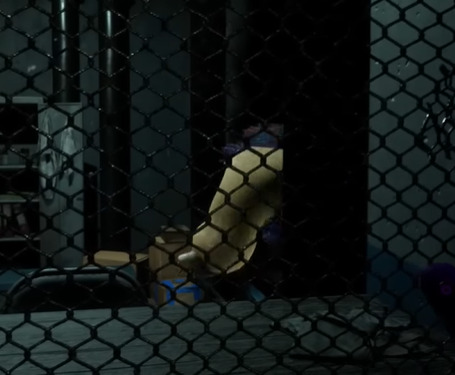
Yarnaby has claws. Neat!

This graffiti's certainly worth analyzing. It's clearly directed to the smiling/nightmare critters, which makes sense with how many of them are crawling around here. But who made this? The eyes could maybe be connected to Harley, but this is his domain and the toys are being shielded from them
Edit: it seems like Doey's made this and, by extension, his own safe haven for other toys. Not a good sign when combined with the hoard of minis, but hopefully they're unconnected
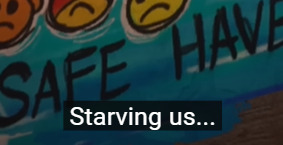
I have to wonder what this guy means(and who he is ig). There's vending machines that you could've used and... everyone's been down there for years. Food was gonna run out eventually and the only choice left is cannibalism(which they're clearly willing to do, nothing's stopping them). Sure Prototype's plan has a few flaws, but the starving thing doesn't seem to be entirely his and Harley's fault

Oh he is big. Bigger Bodies Initiative, I get it, but I assumed he'd be slightly smaller from his introduction trailer
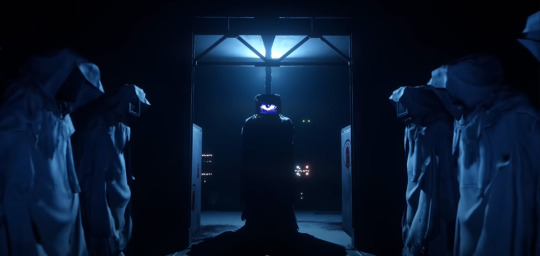
...I will not make jokes. What I will do is notice that The Doctor's clearly got a body. Honestly kinda disappointing(not to mention confusing, but I'll talk about that more in a second). Him only being shown through tvs and other not-body electronics would've been cool
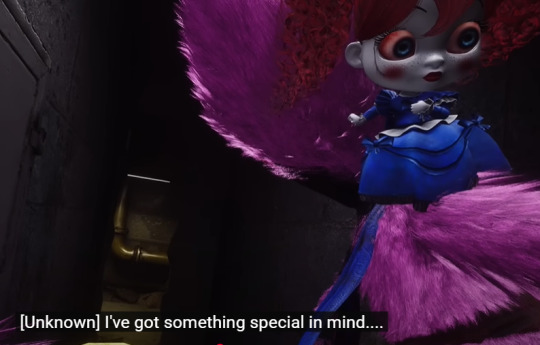
Kissy's alive! Yes! Ignoring Poppy's eyes seeming more bloody than normal, there's an unknown voice. Sure several of the voices are unknown, but this one is directly acknowledged as that. My theory is that it's the Prototype. Something about the way he says "mind" sounds different, added in
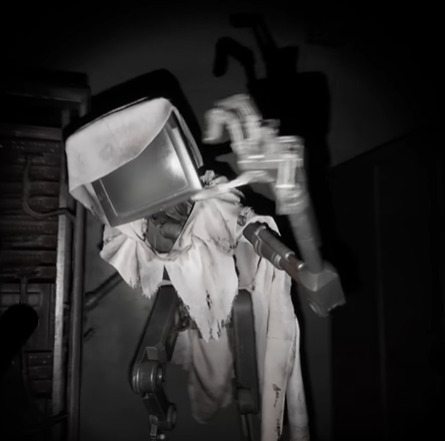
Okay remember that pin? Something about this situation screams "weeping angel" and feels really similar to the Glamrock Endos. But y'know what, the "inspiration vs theft and does that argument even apply" thing isn't new. So I'm just going to ask: what are the tv heads? They wouldn't be toys(I think?) and while the company is cruel, surely they're not stupid enough to give Harley a way to move around even more easily. Maybe these were made by the Prototype? He seems smart enough that it's possible

We finally get to see what role the nightmare critters play and it's... about what I expected. Which is a good thing! Their toy models are pretty cute and it's not surprising that they function the same as the mini smiling critters in chapter 3. But we also get to see two(only one in this screenshot) mini huggies. Which really does highlight that this area is a safe place and may lead to us seeing other types of small toys. I see where Catnap got the idea to watch over the minis
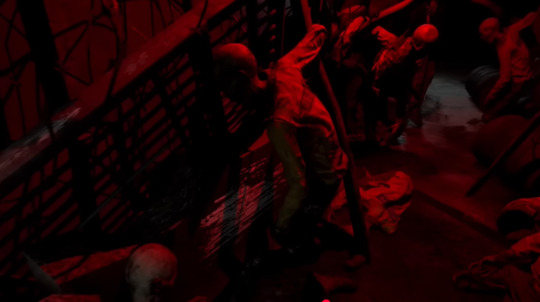
And more of the maybe-corpses. I don't think these are skeletons since one has an ear(you'd think the toys would've picked them clean...), but these just- aren't believable humans??
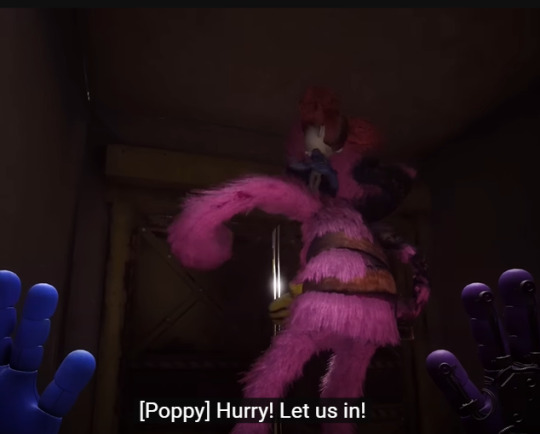
If there's any moment to reveal that Ollie's a traitor, this is gonna be it. Calling it now. Also 1. why are Kissy's injuries depicted like that(assuming it isn't something else). The toys bleed, this is just a fact. 2. what is that thing wrapped around her?? I assumed it was a sling or something, but her injured(?) arm is free to move around. It seems like it could be a bag or bandages, but the former doesn't make much sense and it looks a little too leathery to be the latter
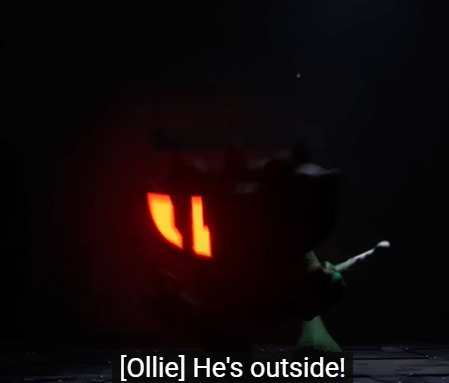
Return of the Ollie and our first look at Pianosaurus in a trailer. The light in part of his mouth makes me curious. His keys seem to have distinct colors and looks more like an injury. Maybe he gets hurt at some point and that's what's on the inside?
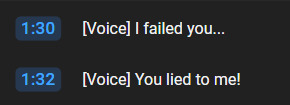
Had to grab the transcript since these are Two captions and I have enough images here as is. Anyway, this is an interesting exchange and use of names(or lack thereof). I'm not sure who the first one is, but the second sounds a lot like Poppy. But shouldn't the captions have just said that? It could be a tape, since those captions don't label who's speaking. But they never explicitly hide it either. Something's up with this
And that's just how the information is presented to us. What's actually being said is a whole different discussion, but I have no clue where to start with this

Now to talk about Doey and the thumbnail for the video. This guy is directly stated(both on twitter and in the description) to be helping us and thank god. All the play-doh falling from the ceiling could maybe pass as creepy(I'll admit, my horror senses are kinda broken), but his actual appearance? I saw the thumbnail and was expecting the worst because even Poppy looks more unnerving than him. But as an ally and not a source of horror? I like him, his design is simple and neat. His first lines get the gist of his personality down(the "hiya there" possibly being what he was meant to be for the kids, while "follow me" is a more mature and real tone) and I can't wait to see what happens with him. As long as the scares involving him are kept to minimum
#poppy playtime spoilers#I'm not putting under a read more. If you don't have 'shorten posts' on by now that's your own fault lol#poppy playtime chapter 4#poppy playtime
14 notes
·
View notes
Text
misogyny in agito past hojos pathetic useless waste of space behavior begin ... well it was always there tbh! [i think this began drafting at 17?]
seeing hojo as not someone with a specific vendetta against ozawa is a failure of the police by default. but then we bring in his teacher, tsukasa, who immediately addresses hikawa first at the table out of all three SAUL members, asks for his point of view, and then prompts ozawa to follow up on hikawa. like shes not the woman in charge of all of it. he asks if they know why, and hikawa goes uh.. and ozawa says No. We don't know yet. and he immediately says oh so you dont know ANYTHING you USELESS FUCKS. obviously we know where hojo gets it
the thing about ozawa is that she is a genius. she went to MIT young. she invented the entire G3 system with her bare hands. she runs SAUL and its her duty. but it does not Belong To Her. the other officers are all men, her senior officers are all men. and they constantly try to take the wheel out of her hands. they constantly take hojos word over her own despite his constant failures and proving himself to be a pathetic coward. ozawa gets NO special treatment, which in theory is reasonable, but she doesnt get Standard treatment either. no matter how smart she is, she is a woman, and in the police (or anywhere in the workforce) that means she has to tolerate pathetic loser men with no talent and no skill beyond being an obsessive bootlicking dipshit being treated as on the same level as her. IT FUCKING SUCKS!
even the addition of tsukasa as his mentor does not absolve him. take a gander at this very funny screenshot.
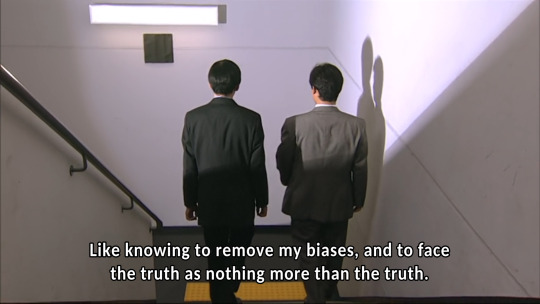
see, the plot in the episodes leading to 19 is that tsukasa is rigging the game against SAUL to get away with murder and nepotism, and in doing so being a misogynistic and condescending prick towards ozawa and her unit and their intelligence overall. the thing is that hojo goes along with this! there is no point in these episodes where he is acting differently than usual except when he realizes his mentor Probably killed someone. if he is otherwise, its because hes so happy to torment ozawa along with his mentor. if anything, this shows that hojo is good at detective work when he applies himself. but he doesnt apply himself to anything but trying to make ozawa's life worse because hes obsessed with the G3 unit.
the only person who gets the grace of a bias being removed is another man in a senior position. not a woman. never a woman.
and ozawa is still kind enough to invite him to bbq afterwards. 🖕
then, you know, V-1 with a board full of male builders, the "best in the world", trying to surpass the G3-X. there is no implication that hojo did a smidge of it himself.
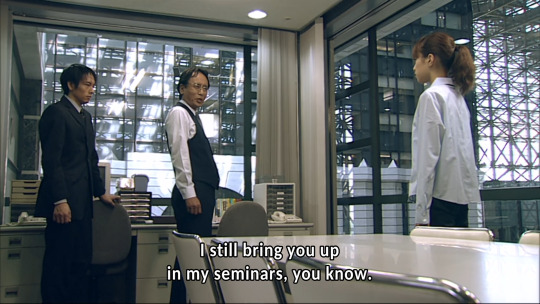
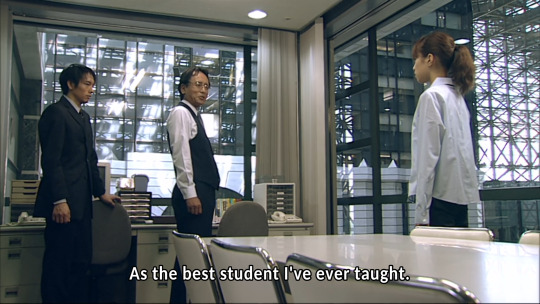
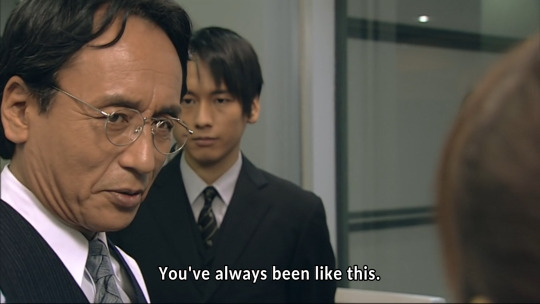
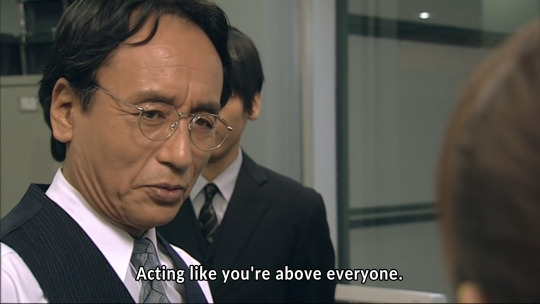
"i flaunt you to express my own ability, but how dare you think youre anyone who matters". feeling threatened by her intellect to the point of admitting that if he saw G3-X's proposal he would give up on V-1, to try to knock her down pegs that she earned and deserves. these are all the kinds of people hojo allies with willingly! doubting her honesty and her will and her dedication to her job. not listening to her as a person and going over her head to the men in charge. and there is nothing ozawa can do about it but prove them wrong, over and over, even if they keep doubting the abilities shes proven she has. over and over.
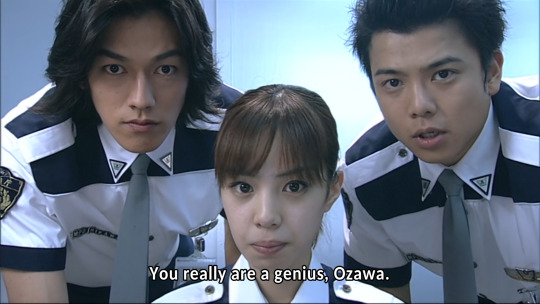
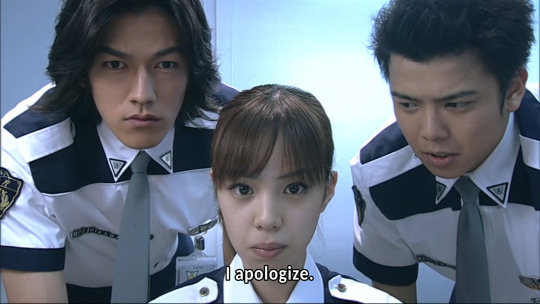
even her own unit member!!!
for hojo, after G3-X proves its worth, this stops his overeager direct haranguement of them, though hes still unpleasant whenever they meet. at least now hes actually doing his job, and for what its worth, hes pretty good at it when hes not wasting his time annoying SAUL.
ozawa is fantastic because these obstacles are neverending, but she never gives up, and she never truly backs down. she refuses to cede any undeserved ground. and her flaw is exactly the same as her strength: shes too smart, she makes things that are too powerful, and theyre hard for others to handle. G3-X injures hikawa so badly he should not be able to move. in that way, things that are too perfect are dangerous, and human flaw is what allows us to shine. it's not that she believed too much in either G3-X or hikawa, but instead that the pursuit of perfection is, in of itself, flawed. in that way, shes a true agito protagonist.
11 notes
·
View notes
Text
A Brief Anti-Psych Perspective on Sleepless Domain
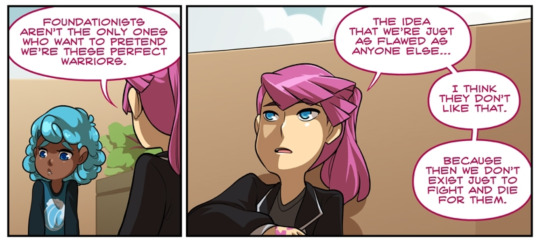
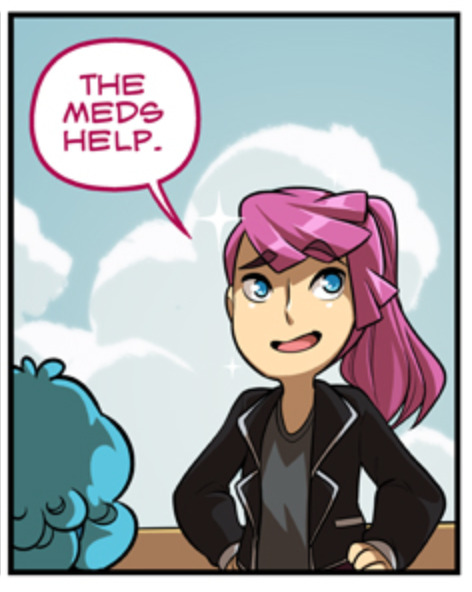
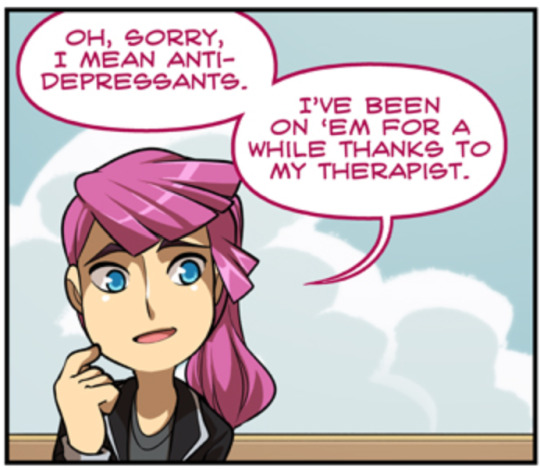
Kokoro, have you considered your depression (dead mom, strained relationship with dad, being a magical girl who has to risk her life every night) is making you depressed, and that your depression is a reasonable response and not a flaw in your character to be fixed?
Obviously, I'm not pro-suffering, or even anti-treatment. But let's be real: this "house of cards" as stressa described it is not separate from the psychiatric system. Psychiatric medicine - even overlooking the flaws in the "chemical imbalance" theory - is frequently used as a tool to cover up problems: You know, problems exactly like this.
The point of her medication is not to make her well, no matter how much everyone involved believes it. The point, within this system, is to make her a better soldier - to cover up her fears, anxieties, and upsets enough to make her functional again. Therapy and psychiatry is beneficial to both oppressor and oppressed without addressing the systemic causes of trauma - if a child is having a trauma response to being tortured, the solution is not to address their response, it is to remove the torturer. And yet, that is the exact solution therapy offers.
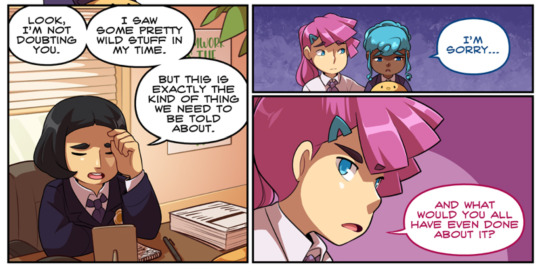
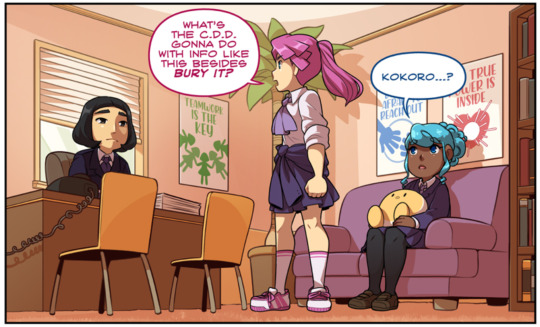
To her credit, Kokoro gets an inkling of getting it in later chapters - but the concept of psychiatry as somehow being removed from the system that sends girls to fight is a prevailing one throughout the comic. But, to anyone paying attention, these are the same system. These characters have such anxiety around being functioning members of society, it distracts them from saying "fuck society" - and, medicine and therapy confirms their prioritizations, rather than truly assuring them of their worth.
There can be no healing within the capitalist system. You can feel better, but self-hatred is a tool used to keep the oppressed in line. This story is not as complex as it appears: There needs to be an end to the monsters. Everything else is a distraction.
#sleepless domain#antipsych#anyway i'm a hater!#insomnia queendom#this is cassandra#i hope this was enlightening to (ex) sleepless domain fans
29 notes
·
View notes
Text
Hello @lemonwoodwrites, your recent response to a post I reblogged inspired some thoughts. To avoid derailing tavtime's post with a drawn out Gale discussion, I am making this separate post. (I am still acquainting myself with tumblr etiquette - if this is not how to go about things, please do let me know.)
The relevant portions of tavtime's original post:
do you ever think about how the afterlife situation in Faerûn is utterly without mercy? [...] do you ever get suspicious that Mystra can't be trusted with Gale's afterlife any more than she could be trusted with his life?
And your response:
Stuff like this makes me mad that they give Gale exactly zero strong arguments for his ascension and then make it the objectively wrong decision (and flatten his motivations in retrospect!) if he does go through with it. Like how much harder would that storyline hit if he could make an actual persuasive systemic critique of the gods instead of just giving you a bunch of weak shit about how wouldn't it be nice if a god had a mortal's conscience? And could convince you to do it not for the power but because the two of you were going to tear the system down? And then when you went through with it, it turned out that godhood is inherently corrupting? And the moral of the story is that the master's tools can't dismantle the master's house? The seeds of this are there. I think they wanted some of it to come across. They just also wanted it to be a story about Gale being overly ambitious and needing to learn that he's fine as he is and doesn't need power. And so it becomes an inherently conservative story that props up an oppressive system. There's no way you can make a serious critique of the power structure of Forgotten Realms gods if the moral of the story is 'your attempt to change the system was actually just hubris and the authorially endorsed Happy Ending is you accepting your place in it'.
I think this doesn't work for a number of reasons.
On a characterization level, a Gale who is leveling systemic critiques is quite frankly a completely different character than the man in the game. Gale does not think particularly systematically and the well being of other people / the world in general is not anything close to his first priority. He does care to some extent - the moment where I began to come around on him was when he was willing to walk off and die alone to prevent anyone else from dying to his orb. But his primary motivation in finding that orb wasn't to protect the world from it - he found it to increase his prestige in Mystra's eyes in hopes that she would let him command yet more powerful magic.
Gale is, fundamentally, a deeply insecure man who is trying to prove his worth through his magical skill and power. His stated goals of becoming a god to 'do better' are both arrogant (there are many good aligned gods - if all of them are not doing anything to help there is a mechanism at play to explain why, he is not special enough to avoid that) and read, to me, as very much a post-hoc rationalization of what he already wants to do. Becoming a god, he thinks, will finally rid him of his insecurities.
It doesn't, of course, which leads me to my next point. Each origin character has an arc where they pursue something that they think will fulfill them but doesn't actually address their underlying problems. In the case of Astarion, Minthara, Wyll (in a somewhat roundabout way), and Gale, that is power. In the case of Lae'zel, Shadowheart, the Dark Urge, and Gale, that is recognition. This is a consistent theme throughout the work - that what people think they need (as a result of their past/environment) can trap them in the cycle that created them, and that they need to look deeper and actually address their root issues if they want to be truly happy. For God Gale to not be objectively the wrong decision would be as thematically incongruous as Ascended Astarion not being his worst ending - it's giving in to the flaw that drives them.
The thing is, Baldur's Gate 3 is an intensely personal game - it is laser focused on individual stories of abuse and trauma and recovery (or corruption) of the main case. It presents the world of Faerun as it has been written in the lore and then lets the audience sit with the implications of that, the effects of this state of affairs on the lives of our main characters.
What kind of change will Orpheus bring to the gith? This isn't relevant - what the story focuses on is that Lae'zel has broken free of Vlaakith's cult . Shadowheart could embark on a quest to try and deradicalize Sharrans or interfere with their recruitment mechanisms, but she doesn't because the story is primarily interested in what brings her fulfillment. Spawn Astarion can help with the other spawns in the Underdark, but that's a sidenote - the story focuses entirely on him overcoming his fear.
It isn't conservative of the game to say that God Gale is an abjectly horrible idea because the game is not trying to make a serious critique of the power structure of Faerun. It is presenting members of a bunch of typically evil factions (warlocks, Blood War soldiers, Sharrans, Gith, vampire spawn, hubristic wizards, drow), showing how they got there, investigating the effects of that on them, and (typically) offering them a way out and a way to embody their villainous trope. Along the way it definitely does show how flawed the entire cosmology is, but that's not a narrative or thematic focus. The only force attempting systemic change are the Dead Three, who are aiming at the mechanism that undergirds the whole system.
Gale suddenly haring off to enact structural change for the betterment of the world would be incongruous both with his character arc as presented and with the greater themes of the work. It would also not really fit in the narrative structure. If the failure is the process of being corrupted by godhood then from a writing perspective you would want to see that. Watch him try and use the master's tools against the master and warp himself. But that involves following god!Gale for some time - it doesn't work with the narrative structure of the game at all. The in-game arc works because the failure point is in choosing to become a god, a pivotal moment that we see and participate in. The glimpse of God!Gale we see in the epilogue is just the aftermath, the proof of the magnitude of his mistake.
It sounds like you really want a story that tackles systemic critiques and structural problems, and personally I think that BG3 is not really a game that focuses on that. If you want a story that is very much interested in those issues, I would highly recommend playing Fire Emblem: Three Houses. I have spent five years discussing that story's approach to systemic critique with friends - it definitely has a focus on structural issues that BG3 does not.
Fanfiction works too, though to my understanding you're already doing that. :)
8 notes
·
View notes
Note
Idk if you’ve ever fully answered this on your blog but: DO YOU THINK Bishop fully redeemed himself in the future? By becoming president and uniting all races? Or is he still 🗑️
Oh man no, I don't think Bishop's Good Guy act is all that genuine. I think there's some change, but at his base, beneath all the subterfuge, he's still the same guy. I may have gone over this on the blog before, but like ey what am I gonna just get handed this opportunity to ramble ad nauseum and not take it? NEVER
There are a few pieces of evidence we can read into regarding the faux-ness of Bishop's new persona. First and foremost, for me, is the two instances where he presents the turtles with his "origin story," so to speak. In each instance, he keeps the details vague, and is very hesitant to admit to any direct wrong-doing on his part. The first story is so vague on the details that it feels like he's trying to brush past the turtles' concerns as quickly as possible. The SECOND, though. Bishop consistently dances around going into any detail about what he did or why it was wrong. And he goes on to push all of the blame onto Stockman! I mean honestly, he says Stockman "took things too far." Like dude!! We already know nothing is "too far" for you! It's very suspect to me that the subsequent lab collapse could have been ALL Stockman's fault. Bishop also elevates his own accomplishments and takes full credit for the success of the PGA. Idk but there's something really insidious to me about how he presents the information to make himself look as good as possible-- and the way he's able to convince at least a few of his former enemies that he's trustworthy.
There are other little inconsistencies in his behavior, like him writing off the turtles' warnings about Sh'Okanabo. The Bishop I know is a paranoid freak, he would never in a million years brush off a lead on a possible threat without checking it at all. And if we assume that, then that suggests Bishop said as much to give the turtles the impression it wasn't something worth looking into, meaning he was probably trying to direct their attention away for some reason. All of this tells me (if we just. ignore the possibility of it being a writing flaw agdhgshd) that Bishop is still a very cold and calculating personality, fully willing to throw others to the wolves for his own purposes, but he is WAY better at manipulting, now.
I've said before that I find it likely Bishop's weakest point is his social skills; we see that his superior officers (i.e. the president) dislike him-- which, frankly, is a detriment to his cause as it put his funding in jeopardy at least once that we know of-- and everyone he meets tends to come away some level of discomfitted. So what FF presents us with is a Bishop who needed to improve these skills for the sake of his ultimate goal. If the safety of earth requires friendly relations with aliens, then he needed to become an ambassador, and if he needed to become an ambassador, then he needed to be less overtly unpleasant. Thus, he changed tack. As a result, we have someone who appears trustworthy and is very good at lying and directing your attention, but is just as utilitarian as ever under the mask. That's just his job, after all.
Other details include:
- His intro. We see Bishop personally taking time out to go through monitors all over the city. He apparently has a very thorough surveillance system that he reviews himself. Again, paranoid freak.
- When addressing the turtles, we sometimes see him slip back into snarkier comments. This usually happens when he's frustrated (snapping at them for not attacking the Mouser fast enough for his tastes,) or when he's not being obeyed (making a snide comment about Cody having nightmares when they refuse to exclude him from a mission briefing.)
- As my friend Trauma pointed out to me recently, when storming the moonbase Bishop's men had their guns defaulted to lethal force, he had to give the order to switch to non-lethal. He was fully ready to wipe that place out.
- His willingness to include the turtles and later Cody on missions strikes me as, yknow, very utilitarian in its own right. Cuz those are teenagers, yeah. It could be argued that Bishop can't tell how old the turtles are but he definitely knows Cody is young, and knows well enough that he shouldn't be in a combat situation. But in the finale he praises Cody's decision to defy him and fight anyway. So what changed? In essence, Cody was effective. Bishop is fine with child soldiers as long as they do a good job (and can't be publicly traced back to him.)
Also like did you see that car chase? He ran civilians off the road and did not give a FUCK. That's the same guy.
#agent bishop#tmnt 2003#asks#there may be more details I missed but this is just from memory#if I were a competent blogger I'd go rewatch the episodes for the 50th time to be sure but I got deadlines to meet SIGH#but yeah no I don't find it plausible that Bishop's entire personality did a heel-face turn#his goal shifting? yeah I can buy that. his learning to navigate social games? absolutely#him becoming genuinely kind and caring and willingly showing that with no ulterior motive? HELL no#Bishop is a 'bigger picture kind of guy.' always has been always will be#remove that and you lose a major facet of what make Bishop Bishop
23 notes
·
View notes
Note
The longer BNHA goes on, the more I start to ask this question.
Is this a story worth telling?
It brought up some interesting things to think about like what it really means to be a hero and if villains really are evil or people that society failed.
But then comes the muddled messages, characters that barely do anything significant other than to be plot devices, the overhyping of one character that ruins the purpose and development of the main character, and the inconsistencies and conclusions that characters come to that makes little to no sense.
Then you just have a story that just goes NOWHERE!
Because let's be honest, how much will society actually change by the end of it all? How will it treat quirkless and those with less than stellar quirks? And will they actually allow people like Bakugou to become heroes all because they "try really hard"?
Hi there, @theloganator101 First off, thank you for the question.
Also, TLDR.
Long before, I had made a somewhat similar post, talking about the same points. What makes a hero a hero? Because it's more than wearing a cape and punching issues and problems into submission. Bad guys simply go to jail and rot till their dying breath. And why is the world of BNHA so black and white? So 'this is good and this is bad'? We have a very compartmentalized version of human society. But you and I both know very well that human nature, human social interactions are the most complex and difficult things to understand. And even though I had seen these flaws in the series much earlier, I was still forgiving of the author because I genuinely thought he would eventually come around and explain why things are they way in the BNHA verse. But that NEVER happened at any point in the series so forget about Hori addressing these issues now because BNHA as a whole doesn't matter.
It's a no brainer to say that the job of a 'hero' is to save the day. But what about those who are the victims of school bullying? (cough cough BkDk is a totally normal and a healthy relationship, you're just a homophobe if you dont ship them) or those who had to keep their voice and entire existence heavily suppressed because your marriage was just a means to an end? (Endeavour is a loving husband, a doting father and a hard working hero) What about those kids who are victims of child abuse, child neglect and discrimination? (the Todoroki kids, Shigaraki, Toga and heck, even low key Spinner grew up in loving and healthy households). The Creature Rejection Clan was created to combat racism and All Might, someone who's name itself reduced crime in Japan by a half simply by existing, did NOTHING against the CRC. I thought 'heroes' were meant to protect the weak and deliver justice to the evil doers irrespective of who or what they are. I thought that's what's really meant to be a hero, to be defenders of mankind. Because lets face it, what's the difference between a villain who kills and a hero who abuses his family members on a physical, mental and an emotional level? What are the required criteria to judge these very two damnable actions with a bias attitude?
Which brings me to another question: Why are the students at UA high only taught martial or physical training? Don't they have special classes where they have to moral education classes or something along those line? Besides the rigorous physical training they need to fight against heroes, they have normal, regular-degular academic curriculum. These so called heroes-in-training are well educated in the art of understanding the topography of a battle field but the system has FAILED to educate the kids to understand why villains are the way they are. The entire system, the root itself, the very foundation of the hero society, FAILED to protect what they claimed to be. People like Toga, Dabi, Overhaul, Spinner, Shigaraki, Twice, Stain, Magne, are all nothing but the products of the hero society, the actual end result of this superficial, celebrity-like lifestyle of hero worship. But many fail to see beyond the stars and shimmers of this artificially constructed world.
The above points are heavily tied to Stain's ideologies. He didn't put up arms and struggles against the hero society for nothing. He knew what he was doing.
This may not be the answer that you're looking for but the way I see it, the MHA story shows us a horrifying representation of our already dark and twisted world but that's where it stops. It wants to do nothing with it because the story doesn't know where to go with it and how to go about doing it. It started something it couldn't finish. It created issues it couldn't solve. So the plot choose a different path to tread upon: focus on the popular people from the hero society who are highly questionable and romanticize their words and actions. It doesn't matter if you faced quirk discrimination or worse, became a butt of ridicule for not having any quirk at all. So long as a bully has given a half baked ''apology'' and works hard to be a hero to satisfy their own ego, it's all good at the end of the day. Self worth issues, self inflicted bodily harm, lack of self worth received by the victim (definitely NOT Izu because Bk treats him with utmost respect and comradery), all melt away due to the power of 'apology' and friendship. It teaches us that celebrity worship, fake sense of heroism, the desire to be the top at the expanse of others are to be treated with normalcy because the show must go on no matter what. The other message is that it's ok be a wife beater and a bully so long as you're doing it for heroism, name, fame, recognition.
Our priorities in the MHA universe are all messed up. We don't even have an inkling of a thought about how Izu feels about quirkless discrimination and the manga is wrapping itself up. So all the answers we can provide ourselves with regarding the matter will be head canon.That's why the main message of the story is that it fails on so many levels in terms of writing a morally upright story. The main hero of our story is nothing to offer, no words of hope and encouragement. That's the other message it has conveyed to us. I'm not saying this, the manga has proven to us time and again what i just said. The other thing it hammers home is the fact that, so long as you're a hero, your unjust behavior will be swept under the rug by your school and higher authorities. The message that MHA time and again conveys is that it loves hypocrisy and double standards. These are the solid reasons as to why the plot cannot logically and cohesively march forward.
"With great power comes with great responsibility" and the MHA verse failed to understand this concept by becoming the very thing the villains are condemned for in this series. That, my friend, is the general message of the story. That, my friend, is the moral lesson of the MHA verse.
#MHA critical thinking #bk is a bully #Izu deserved better #Izu is the protagonist not Bk #Izu matters Bk doesnt #Hori cant write shit
20 notes
·
View notes
Text
Bitcoin: The Final Chapter in the Evolution of Money

Money has always been a mirror of humanity’s progress, a quiet witness to our creativity, our ambition, and our need to connect. From the humblest beginnings of bartering goods to the intangible brilliance of Bitcoin, the evolution of money is more than just a history lesson; it’s the story of us. It reflects how societies grow, how trust is built, and how power shifts. Today, as Bitcoin enters the global stage, it forces us to question whether we are standing at the pinnacle of monetary evolution—or perhaps just the beginning of something even greater.
In the earliest days of human exchange, bartering was the default. You had a goat, and someone else had grain. The trade was straightforward but cumbersome. What if the grain farmer didn’t need a goat? Or worse, what if your goat was only worth half the grain? The inefficiencies were glaring, and the limitations of barter pushed humans toward something ingenious: a universal medium of exchange.
Seashells, beads, and other symbolic objects emerged as early forms of money. These tokens weren’t inherently valuable but were agreed upon as valuable within their communities. Money wasn’t about the item itself; it was about the trust it represented. The innovation here wasn’t in the material but in the idea that value could be symbolized, portable, and shared across a group.
Then came the era of precious metals, particularly gold and silver. These materials brought durability, rarity, and divisibility to the concept of money. They weren’t just tokens; they had intrinsic qualities that people admired and trusted. Ancient societies began minting coins, stamping them with marks of authority to guarantee their weight and purity. Trust now extended beyond the material to the entity that issued it. Coinage became not just a tool of trade but a symbol of state power and reliability. Yet, even this system wasn’t without its flaws. Governments could and did debase currencies, mixing in cheaper metals to stretch their reserves. Trust, as it turned out, could be manipulated.
Fast-forward to the advent of paper money, and the story becomes even more about trust—or the illusion of it. Paper notes were initially redeemable for gold or silver, a convenient stand-in for heavy metals. But over time, the promise of redemption was quietly eroded. Money became untethered from tangible assets, and its value rested solely on the word of governments and central banks. This system allowed for incredible growth and convenience, but it also introduced a new fragility. Inflation, currency devaluation, and financial crises became recurring features of a world where money was no longer scarce but infinitely printable.
The digital age brought another leap forward. Credit cards, online banking, and mobile payments made money faster and more accessible than ever. Transactions that once took days or weeks could now be completed in seconds. Yet, these systems remained centralized. They relied on banks, payment processors, and governments to function. They introduced layers of fees, opportunities for censorship, and risks of fraud. Trust was no longer local or even national; it was global, but it was still concentrated in a few hands. This centralization set the stage for a radical disruption.
Enter Bitcoin. For the first time in history, money could exist outside the control of any government, bank, or corporation. Bitcoin didn’t just tweak the rules of the game; it rewrote them entirely. It offered scarcity in a digital form, capped at 21 million coins. It provided security through cryptography and transparency through its blockchain. Most importantly, it eliminated the need for trust. In the world of Bitcoin, the code is the trust.
Bitcoin is the culmination of everything money has been striving to become. It’s durable, divisible, portable, and scarce. But it goes further, addressing the flaws that plagued its predecessors. There are no rulers to debase it, no borders to limit it, and no intermediaries to exploit it. Bitcoin is money distilled to its purest form: a universal ledger that belongs to no one and everyone simultaneously.
Of course, the journey isn’t without its challenges. Bitcoin’s energy use is often misunderstood, its volatility scares off the faint-hearted, and its decentralized nature invites scrutiny from regulators. But history has shown that every revolutionary form of money faced skepticism. The first coins, the first banknotes, even the first credit cards—all were doubted before they became indispensable. Bitcoin’s path is no different. What sets it apart is its adaptability. Like an open-source organism, Bitcoin evolves, incorporating improvements and addressing its shortcomings through the collective effort of its global community.
As we look back on the history of money, a pattern emerges. Each new form of money solved the problems of the last while introducing possibilities that were previously unimaginable. Barter gave way to tokens, tokens to coins, coins to paper, paper to digital—and now, digital to decentralized. Bitcoin fits seamlessly into this arc, not as a replacement for what came before but as the next step in the natural evolution of money.
The question isn’t whether Bitcoin fits into the story of money. It’s whether we—as individuals, as societies, and as a species—are ready to embrace what it represents. Bitcoin challenges us to rethink not just how money works but what money is and who should control it. It invites us to imagine a world where trust is embedded in systems rather than institutions, where value is transparent rather than opaque, and where money is as free as the people who use it.
Bitcoin feels like the culmination of money’s evolution. From here, the only changes will likely revolve around how people choose to use it.
Take Action Towards Financial Independence
If this article has sparked your interest in the transformative potential of Bitcoin, there's so much more to explore! Dive deeper into the world of financial independence and revolutionize your understanding of money by following my blog and subscribing to my YouTube channel.
🌐 Blog: Unplugged Financial Blog Stay updated with insightful articles, detailed analyses, and practical advice on navigating the evolving financial landscape. Learn about the history of money, the flaws in our current financial systems, and how Bitcoin can offer a path to a more secure and independent financial future.
📺 YouTube Channel: Unplugged Financial Subscribe to our YouTube channel for engaging video content that breaks down complex financial topics into easy-to-understand segments. From in-depth discussions on monetary policies to the latest trends in cryptocurrency, our videos will equip you with the knowledge you need to make informed financial decisions.
👍 Like, subscribe, and hit the notification bell to stay updated with our latest content. Whether you're a seasoned investor, a curious newcomer, or someone concerned about the future of your financial health, our community is here to support you on your journey to financial independence.
📚 Get the Book: The Day The Earth Stood Still 2.0 For those who want to take an even deeper dive, my book offers a transformative look at the financial revolution we’re living through. The Day The Earth Stood Still 2.0 explores the philosophy, history, and future of money, all while challenging the status quo and inspiring action toward true financial independence.
Support the Cause
If you enjoyed what you read and believe in the mission of spreading awareness about Bitcoin, I would greatly appreciate your support. Every little bit helps keep the content going and allows me to continue educating others about the future of finance.
Donate Bitcoin: bc1qpn98s4gtlvy686jne0sr8ccvfaxz646kk2tl8lu38zz4dvyyvflqgddylk
#Bitcoin#EvolutionOfMoney#Cryptocurrency#DigitalGold#MonetaryRevolution#BlockchainTechnology#FutureOfFinance#DecentralizedMoney#FinancialFreedom#BitcoinPhilosophy#CryptoCulture#MoneyMatters#BitcoinEducation#DigitalCurrency#CryptoEconomy#BarterToBitcoin#InnovativeFinance#BitcoinCommunity#FinancialEvolution#SoundMoney#financial education#financial experts#globaleconomy#finance#financial empowerment#blockchain#unplugged financial
2 notes
·
View notes